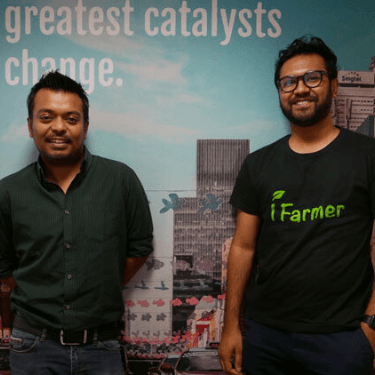Agri-fintech startup iFarmer secures $500,000 in seed funding
Bangladesh agri-fintech startups raises seed funding of US$500,000 from Accelerating Asia and unnamed angels from Singapore, Bangladesh and Indonesia. To support the launch of new products and increased growth, iFarmer is seeking an additional $350,000 to close out the round.

Founded in 2018, iFarmer provides farmers with access to finance, technology-driven advisory as well as premium markets for their produce. Working closely with investors and farmers, iFarmer has empowered 1500 farmers across Bangladesh and facilitated close to $1 million in financing for farming.
“iFarmer plans to put the new capital towards general growth, including hiring new staff, improving the tech and data-enabled finance and supply chain capability, expanding logistics and looking into expanding financing retailers and traders,” iFarmer Co-Founder Fahad said.
“We find that it’s the enthusiastic middle-income population who are passionate about agriculture and want to see investment returns who are interested in financing farmers and investing with iFarmer,” Fahad said.
iFarmer is also looking at expanding its offerings to deliver different products.
“We already work with insurance companies to insure farms but they are also working on a platform that could enable financial institutions to lend to farmers, agro retailers and traders in an efficient and easy manner,” Fahad said.
“iFarmer is also finding innovative pivots and ways to expand their business, having recently partnered with eCommerce platforms to provide end-to-end food supply,” Accelerating Asia Co-Founder Craig Bristol Dixon said.
The Agriculture sector of Bangladesh provides 40% of the employment and contributes 14% of the $340 billion GDP, which is amongst one of the fastest growing GDPs in the world. Although the numbers are impressive, but agriculture in Bangladesh faces unique challenges. There are roughly about 20 million farmers in the country and more than 80% are smallholders, mostly unbanked or limited access to formal financial services, and the overall agriculture sector is highly un-organized.
“In Bangladesh, agriculture contributes a significant portion to the country’s development; however working capital is still a major concern for farmers that’s where a startup like iFarmer can deliver,” Accelerating Asia Co-Founder and General Partner, Craig Bristol Dixon said.
There are roughly about 20 million farmers in the country and more than 80% are smallholders, mostly unbanked or limited access to formal financial services, and the overall agriculture sector is highly un-organized.
Most of the farmers get their working capital from the loan sharks and the middlemen instead of a bank as they find it to be a more feasible option. The rates at which middlemen offer the loans are extremely high. As a result, the number of farmers in the country is decreasing due to the perception that being a farmer will lead them to poverty.
With such a big home market, for now iFarmer’s ambitions are firmly focused on Bangladesh, but the team believes that the business can expand overseas into countries like Myanmar, Cambodia, Laos and more.
iFarmer is currently raising an additional $350,000 to build an efficient supply chain of farm produce and intends to use the fund in building infrastructure, technology and people to manage the supply chain.

